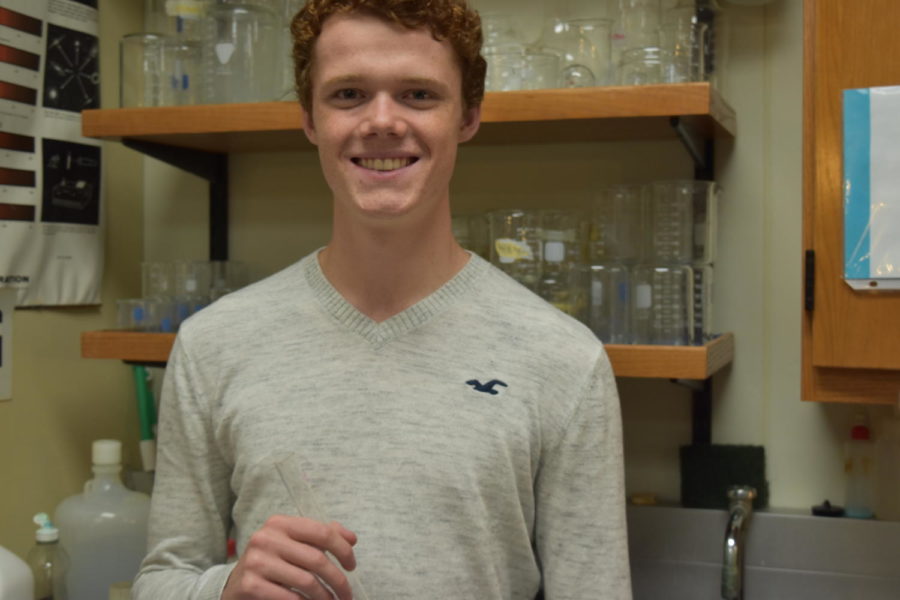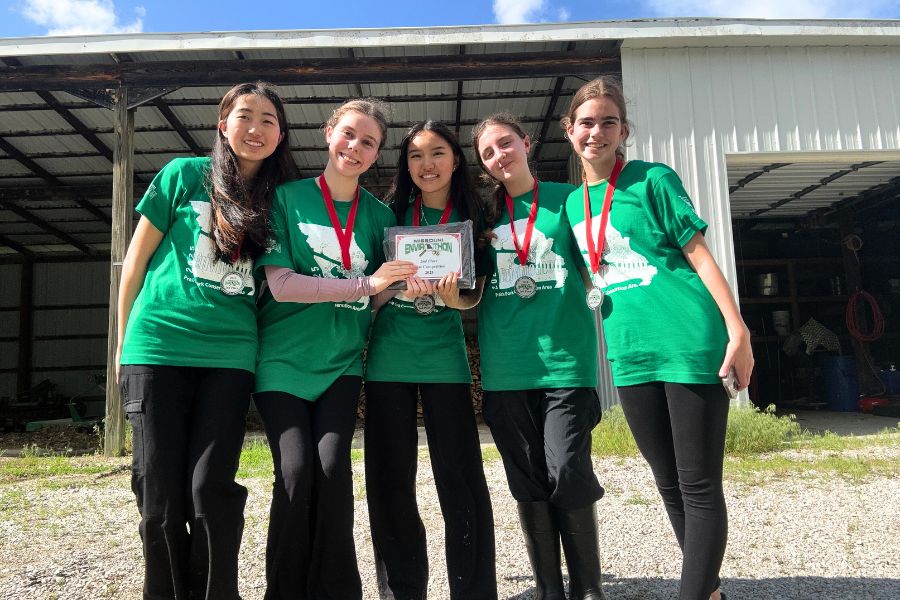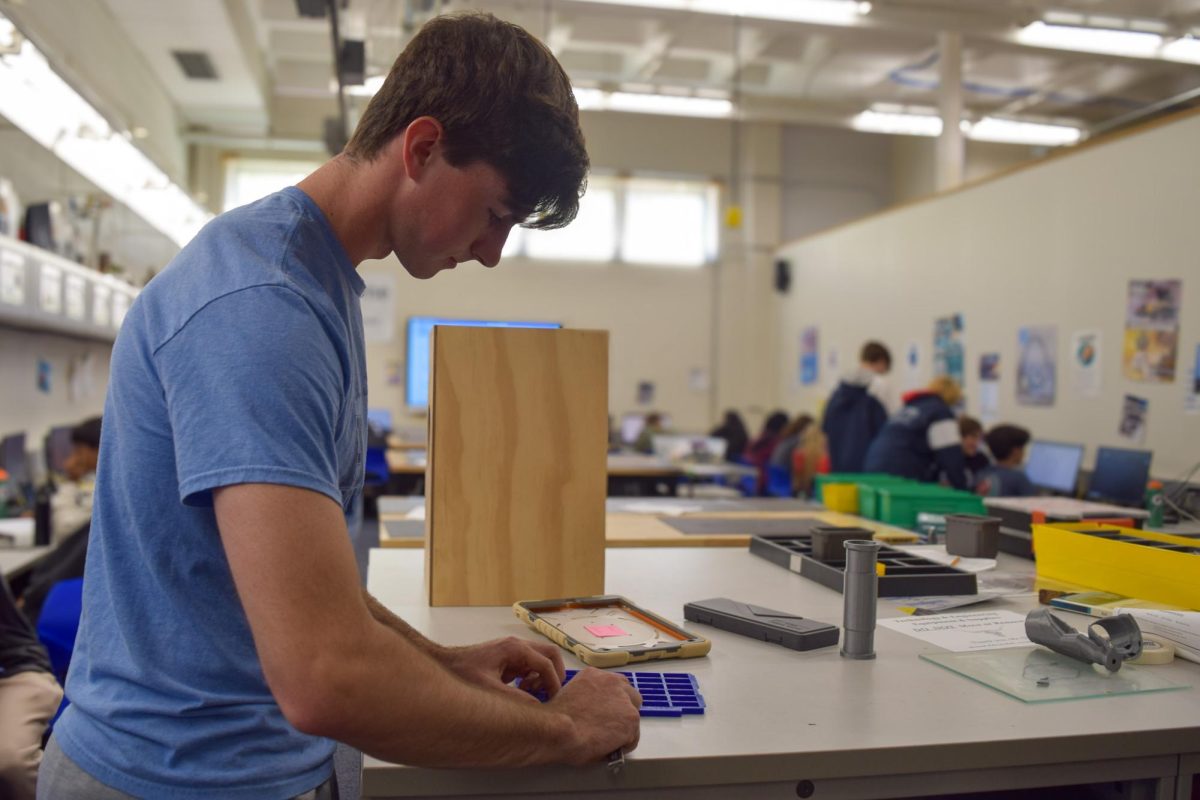While other students are busy cramming their AP government packets and Gatsby reading over summer break, senior Nick Bateman was researching TAU proteins and Alzheimer’s disease at the labs in Washington University in St. Louis.
“I was interviewed by one of my father’s colleagues and after they decided to let me into the lab, I started working right away,” Bateman said. “My dad works at WUSTL in the Neuroscience department.”
TAU are neuronal proteins that stabilize microtubules, and they are found abundantly in the body’s nervous system. When there are mutations in the TAU protein, they can become defective or damaged, resulting in autosomal dominant neurodegenerative disorders, such as Alzheimer’s disease or Parkinson’s disease.
“I started a week after school ended and all the way to the last week of summer. My work schedule was every Monday through Friday, nine hours each day,” Bateman said.
Bateman started researching at WUSTL the summer before his junior year.
“This was my second year in a row to have an internship at WUSTL. I am very passionate about science and I wanted to do it for the experience and research about TAU,” Bateman said.
After his first two weeks of being in the lab, Bateman discovered the importance of every small detail executed in his research and the level of commitment he would need to apply.
“It was very difficult, especially at first because the people I worked with were in a completely different league than I was in, and there was a steep learning curve,” Bateman said. “Even though I was the only high school intern, I still was able to make friends and feel comfortable in the lab.”
Along with connecting and working with new people, Bateman was led by his mentor and professor Kathleen Shock.
“I didn’t do that much handwritten work or computer work, but I had a lot researching and experiments that I conducted. First, I would get protocol of the experiment from my mentor Kathleen, and then I would clean off my lab bench and make sure I had the right supplies,” Bateman said. “I was troubleshooting experiments and learning how I could make them more precise and accurate, but this process took a lot of time. I would then get started on my experiment and try my best to not make any mistakes, I didn’t want to disappoint Kathleen or myself and sometimes it was very stressful.”
In addition to his internship at WUSTL, Bateman is also a part of Beta Chi Pi and has taken several honors and advanced placement science classes.
“Taking Biology as a freshman definitely started my interest in biology, and I also had the outside factor of my dad being a neurologist,” Bateman said. “I advise anyone who is seriously interested in going into any sort of field in biology to take advantage of our science classes and see if you can find any type of shadowing or internship that is hands on for the type of biology you like.”
Although the internship took up his entire summer, Bateman knows that this is something he is truly passionate about.
“It feels really good knowing that my research is going to help people. The labs and all my hard work has a deeper meaning to it, and the research will contribute to the science community,” Bateman said. “Improving the lives of others and trying to find cures to diseases such as the ones from TAU mutations can be huge steps to improving lives for so many people.”
Although the field of biology is large, Bateman has a great interest in the CRISPR cas9 system and genetic engineering. He is planning on continuing and pursuing his interest of biology in college and further parts of his life.
“The CRISPR cas9 system is super interesting to me [and] allows you to change your DNA and specifically alter your proteins, so genetic engineering is something that I’d like to further research in. Additionally, I think there are a lot of opportunities for STEM cells and tissue regeneration, which are some things that are definitely interesting to me,” Bateman said. “Sometimes your passions take you places, and biology has done exactly that.”



![Focused on providing exceptional service, sophomore Darsh Mahapatra carefully cleans the door of a customer’s car. Mahapatra has always believed his customers deserve nothing less than the best. “[If] they’re trusting us with their car and our service, then I am convinced that they deserve our 100 percent effort and beyond,” Mahapatra said.](https://pwestpathfinder.com/wp-content/uploads/2025/10/DSC_0018-1200x800.jpg)
![Sophomore Aleix Pi de Cabanyes Navarro (left) finishes up a soccer game while junior Ava Muench (right) warms up for cross country practice. The two came to Parkway West High School as exchange students for the 2025-2026 school year. “The goal for the [exchange] program is to provide opportunities for both Parkway students and our international exchange students to learn about other cultures, build connections and become confident, capable, curious and caring — Parkway’s Four C’s — in the process,” Exchange Program Lead Lauren Farrelly said.](https://pwestpathfinder.com/wp-content/uploads/2025/10/Feature-Photo-1200x800.png)

![Gazing across the stage, sophomore Alexis Monteleone performs in the school theater. The Monteleone family’s band “Monte and the Machine” has been releasing music since 2012, but Alexis started her own solo career in 2024 with the release of her first single, Crying Skies. “My whole family is very musical, [and I especially] love writing [songs with them],” Monteleone said.](https://pwestpathfinder.com/wp-content/uploads/2025/09/DSC7463-1200x798.jpg)
![Amid teaching a lesson to her AP Calculus BC class, Kristin Judd jokes alongside her students in their funny remarks. Judd has always enjoyed keeping the mood light in her classroom, along with on the volleyball court. “[I enjoy] that side talk where you see [or] overhear a conversation and chime in, or somebody says something funny,” Judd said.](https://pwestpathfinder.com/wp-content/uploads/2025/09/image-1200x730.jpg)
![Eyeing the ball, junior Ella McNeal poses for her commitment pictures at Clemson University. McNeal’s commitment comes after months of contact with top Division 1 soccer programs. “ It has taken a lot to get to where I am, but I know that [what] I've already been through is just the beginning, and I can't wait for what is to come,” McNeal said.](https://pwestpathfinder.com/wp-content/uploads/2025/09/IMG_4926-1200x900.jpeg)


![Senior Adam Zerega stands with senior Dexter Brooks by farm equipment. Zerega often worked with friends and family on his farm. “I've been able to go to my family's farm since I was born. I [spend] at least three weekends a month [on the farm], so I'm there all the time,” Zerega said.](https://pwestpathfinder.com/wp-content/uploads/2025/04/IMG_4872-1200x900.jpg)

